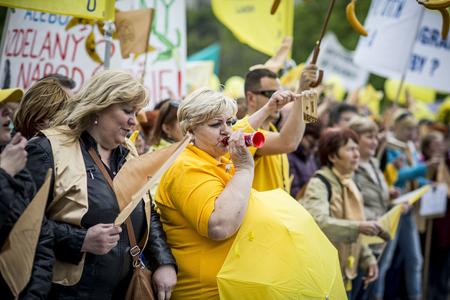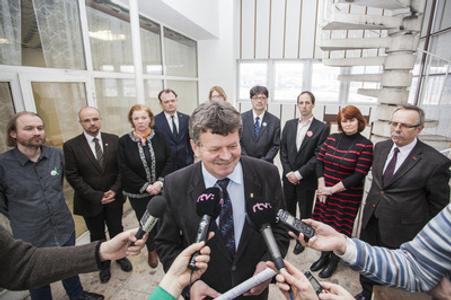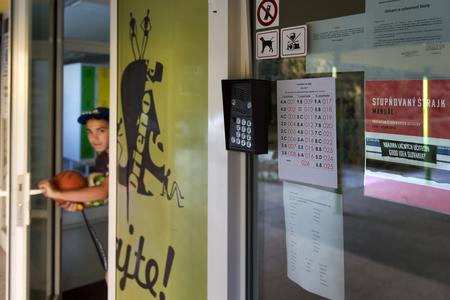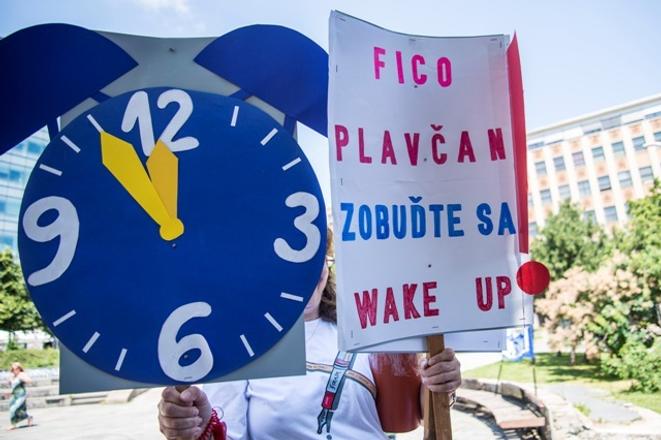Teachers’ protests do not seem to have moved the government to hike their salaries further.
The draft state budget that the cabinet green-lighted on October 5 and is now on its way to parliament does not account for additional resources for the education sector, other than to cover the already planned increase of 6 percent for teachers that has been applied as of the start of this academic year on September 1.
That pay raise came on the heels of massive protests and teachers' strikes particularly before the March 2016 parliamentary election fueled mainly by the Initiative of Slovakia’s Teachers (ISU). But the teachers made it clear that they did not deem the 6-percent increase sufficient.
“The finance minister’s proposal that pedagogic employees shouldn’t receive any further raise as of January 1 is a mockery,” ISU’s Branislav Kočan said as quoted by the TASR newswire.
Head of the "old" School Unions Pavel Ondek, whose organisation did not support the protests before the elections and argued they were going to wait for the new government’s attitude, now admits he is disappointed with the proposal.
“I’m convinced that the state does have the reserves to increase teachers’ salaries more point-blank,” he said as quoted by the Sme daily.

Education Minister Peter Plavčan met with representatives of the teachers unions on October 5 but the meeting failed to bring a result that would put an end to protests. Ondek in fact spoke quite to the contrary, saying that “the contours of the strike are coming closer, not further from us,” as quoted by the SITA newswire.
“Time seems to have stopped at the ministry,” Ondek said, adding that the meeting brought nothing new.
The unions responded by convening an extraordinary session scheduled for October 12, to include all the signatories of the joint declaration for the support of better standards in education and science in Slovakia, which was signed in January, before the elections.

The unions maintain that it is unacceptable that salaries of teachers shouldn’t increase as of January 1.
More talks about more money
Minister Plavčan on the other hand stressed that education got €207 million more in the draft budget and in fact when the expenses in the sector are considered it is even €300 million more, SITA reported. This includes the €77 million deemed for the 6-percent increase in salaries that was put in place as of the start of this academic year, September 1, 2016.
He is now focused on negotiations about the salaries of the non-pedagogic staff at schools and after the talks are wrapped up he is planning to talk to the teachers’ unions about “increasing the attractiveness of teaching jobs” also through increasing their salaries.
Salaries of non-teaching staff should increase based on the proposal from the collective negotiations by €23, in one go with the salaries of all the employees of the state and public sector. Teachers are excluded from this increase because of the 6-percent hike from September.
Salaries still low
Slovakia has become known for low teachers' salaries especially when compared to the OECD average. OECD representatives in February cited the results of their two analyses to support their claim that Slovakia should spend more money in the education sector. Slovakia should also focus on expansion of pre-school education and on raising salaries of teachers and other leading employees of the education system, says the OECD Reviews of School Resources: Slovak Republic 2015 .
While teachers at kindergartens earn about €600 gross per month on average, teachers at primary schools €762 and teachers at secondary schools €791, the average pay of other university educated employees amounts to about €1,102, according to the statistics published by the Platy.sk website in November 2015.
The sums requested by the teachers’ representatives are much higher than the already applied 6-percent raise. They want the salaries increase to at least the sum equalling 1.2 times the average wage in the national economy, which would require an additional €140 for each salary.
The salaries in education between the years 2016-2020 will increase by a total of 31.3 percent, on which it will allocate altogether €1.084 billion from the state budget, according to the Education Ministry’s statement provided to The Slovak Spectator earlier this June.
Meanwhile, economists commenting on the draft state budget pointed out that the government could hardly use the excuse of an unfavourable economic situation or lack of money, as the state budget counts on increased income from EU funds and from taxes.
ISU unknown to Danko?
Parliament’s Speaker Andrej Danko who chairs the Slovak National Party (SNS) that nominated the education minister, warned the teachers that they should be cautious not to cross the “latent line” with their protests and negotiations.
Speaking to the media on October 3 Danko said that anyone who is asking a hike of more than €100 has no idea what they are asking for, the TASR newswire reported. He called the ISU an unknown organisation that has no legitimacy to act as the partner in negotiations with the government, unlike the school unions led by Ondek.
Reacting to Danko’s claims that the strike organised by ISU is illegal, the leaders of the initiative said they hope only courts can proclaim a strike illegitimate.
“We realise our struggle now acquires a new dimension, it is no longer only about our demands but also about principles of democracy,” ISU’s Vladimir Crmoman told the press on October 4.
Danko supported the demands of the ISU before the elections that lifted his party to the government, based on an e-mail that the ISU received from his party’s expert on education Ludovit Hajduk. They received the e-mail in January 2016 and it states that SNS promotes “almost identical demands” in its election programme.
“SNS supports your demands for further expert dialogue to set up systemic measures to increase our education,” Hajduk wrote in the e-mail to ISU.
Basal march instead of basal calm
Meanwhile, Finance Minister Peter Kažimír said that teachers should keep “basal calm”. Teachers instead have planned the Basal March as a protest action for October 7. They will march to the Finance Ministry.
The protest march will take place on October 7 and will start at 8:30 from the building of the trade unions.
“It will be a march for those who disagree with the way the status of teachers is belittled in our society,” Jarmila Javorková of ISU said, as quoted by the TASR newswire. “It is also a march for those who disagree with the zero increase in teachers’ salaries, regarding the promises made as a mockery.”

In addition to the protest march, the participating teachers will not teach during the first four lessons.
ISU will also shorten the breaks between the days when teachers strike, from eight to six. The next strikes will take place on October 13, 19 and 25. During these days the teachers will not teach during the first four lessons, explained Vladimír Crmoman of ISU, as reported by TASR.



 Prime minister and education minister, wake up! (source: TASR)
Prime minister and education minister, wake up! (source: TASR)